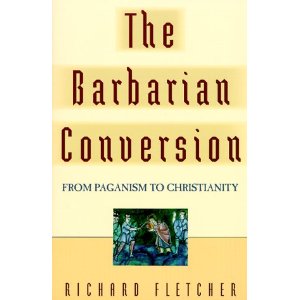If you are interested in some light reading I would highly recommend this book. It hooked me on the very first page –
Who is Christianity for? It may seem and odd question. The plainest of answers is furnished by the so-called ‘great commission’ which concludes St. Matthew’s Gospel: ‘Go ye therefore and teach all nations, baptising them in the name of the Father, and of the Son, and of the Holy Ghost.’ What could be more explicit than that? But it needs only a slight acquaintance with the history of the past 2000 years to show that Christians have not always heeded even the least ambiguous of instructions. Consider the withering rebuke delivered by a gathering of Baptist ministers to the young William Carey, later to be so famous in the Indian mission field, when in 1786 he first voiced his wish to become a missionary: ‘Sit down, young man. When it please the Lord to convert the heathen He will do it without your help or mine.’ (“The Barbarian Conversion from Paganism to Christianity”, by Richard Fletcher, New York, Holt and Company, page 1.)
“But it needs only a slight acquaintance with the history of the past 2000 years to show that Christians have not always heeded even the least ambiguous of instructions.” What a great line and how true! Another great line is that the “proffer of faith to the barbarians” was not inevitable. There is evidence that pagans, mainly Germans, who fought hard to bring down the Roman empire and who had become acquainted with Christianity were the motive force of bringing the new faith to all of Europe. If that is true, and I believe that it is, then how did we get from German culture and organization being the force behind the Christianizing of Europe and the extension of Christianity all the way into China from about the year 550 on, to the belief that Martin Luther and post reformation Lutheranism had no theology of mission? That is about 1000 years of separation between “mission” activity and a lack of mission theology! If I am reading the quote above correctly, it was another 3oo years and the missionary enterprise is practically called blasphemous! We can argue about it all we want but the general consensus seems to be that the Reformation was about getting the Gospel right. Most theological movement from then on was keeping it right for “us”. In fact at the turn of the 19th century the Church of Scotland proclaimed that preaching the Gospel to the heathens, “reversed the order of Nature”.
So how did that effect us? Has it effected us? If you say “no” I want to challenge you. I have heard more than one Pastor bewildering complain that after he had brought some (you supply the adjective) poor, lower class, handicapped, or foreign family into the church, more than one “long time” member asked the question; “what are people like that doing in the church in the first place?’ Is the implication that the church is not meant for the poor, lower class, handicapped, or foreigner, or that this church is not meant for them. Can we blame the Pastor for lousy catechesis? What does a question like that say about us “getting the Gospel right”? It raises the question about what faith really is. Let’s get a discussion going on this topic because it is extremely important to who we are and what we do together.


